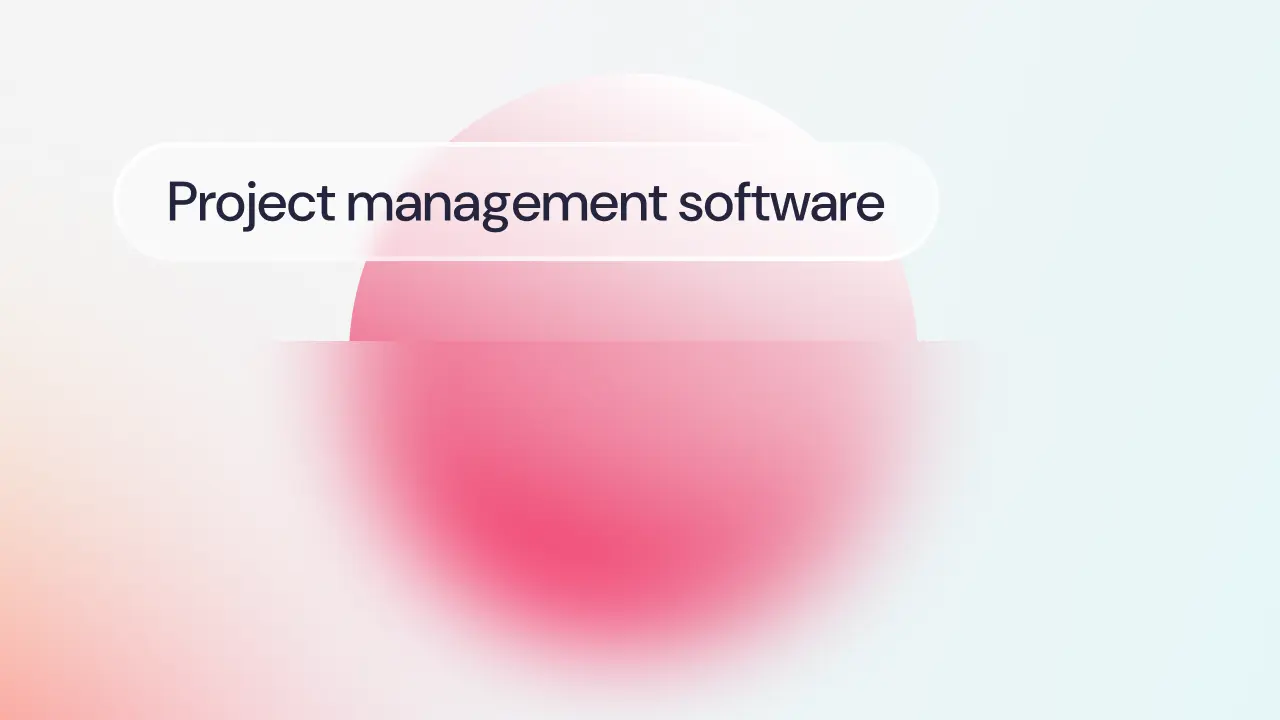Managing a construction company is a complex and challenging task that involves project planning, workforce management, budgeting, health and safety compliance, and numerous other responsibilities. Thankfully, there are digital solutions to support different aspects of the work involved in completing construction projects of all sizes.
In this article, we define what construction business management software is, outline its key features, and explore some of the available options. While some people focus on project management software for construction companies, it is essential to remember that tools that support HR are also key to business success for organisations involved in building projects.
What is Construction Business Management Software?
Construction business management software is a digital platform that helps construction companies manage the many requirements of their business operations. Business management software supports companies with a variety of tasks, including:
- Planning projects
- Health and safety requirements and compliance
- Contracts
- HR needs
- Resourcing planning
- Communications
Utilizing software can help you overcome many of the daily challenges faced in the construction industry. Common struggles, such as high turnover rates, skilled labor shortages, and difficulty attracting new talent, will be mitigated with the support of construction software.
Key Features of Construction Business Management Software
Let’s have a look at some of the key features of construction business management software in more detail:
Project Planning
Software can assign resources, schedule tasks, and track progress on milestones and deadlines. Most software solutions use Gantt charts as the foundation for their project planning, often featuring advanced features such as real-time updates, integrated communication, and resource management.
Workforce Management
Software can support companies in creating rosters and scheduling shifts for staff, tracking that they are working on the correct jobs for the project, and allocating labour costs to the different parts of the project. Digital platforms typically enable workers to clock in and out, request holidays and leave, and access information about their shifts from their mobile phones.
Financial Management
By combining information on current projects and workforce requirements, business management software can support construction companies with budgeting and forecasting, as well as tracking the expenses of each project. Many platforms integrate with accounting systems, such as Xero and QuickBooks, enabling companies to pay invoices, bill clients, and manage payroll while tracking the financial implications of these activities.
Compliance and Safety Tracking
These digital platforms support compliance by providing site safety checklists, scheduled prompts and reminders for health and safety requirements and creating audit trails to prove legal obligations. The software often has incident reporting tools and certificate tracking, such as systems for storing relevant information from employees’ CSCS (Construction Skills Certification Scheme) cards.
Document Storage
Business management software provides a secure platform for construction companies to store, manage, and maintain version control for the large variety of documentation involved in their work. This software includes documentation for the projects, such as submittals, RFIs, and order tracking, as well as documentation relating to employees, including personal data, performance reviews, and certificates they hold.
Subcontractor and Vendor Management
Digital software programmes can support construction companies in onboarding new contractors, tracking credentials, and managing bids and relationships with vendors as needed. The software typically facilitates communication between parties, including logging interactions in case of issues, and tracking payments.
Equipment and Asset Management
Business management software helps construction companies track their inventory, alerting them when they need to reorder or adjust their plans based on the available inventory. Many programmes can also report on asset usage, create and track equipment schedules, and provide maintenance logs to ensure employees remember to do the necessary work to keep everything working safely.
Mobile Access and Integration Capabilities
As mentioned, business management software is often available as a mobile app, allowing construction companies to receive real-time updates on projects and enabling their employees to track their working hours easily. Depending on the different platforms, it may also support custom integrations through open APIs and sync with other programmes such as accounting, HR, CRM and ERP software.
Top Construction Business Management Software Solutions
When it comes to selecting the right business management software for your business, there is a wealth of options available. Each platform offers slightly different support, so it pays to spend some time thinking about your business’s needs and ensuring that the platform you choose will meet them all.
1. Factorial: The Best Business Management Software
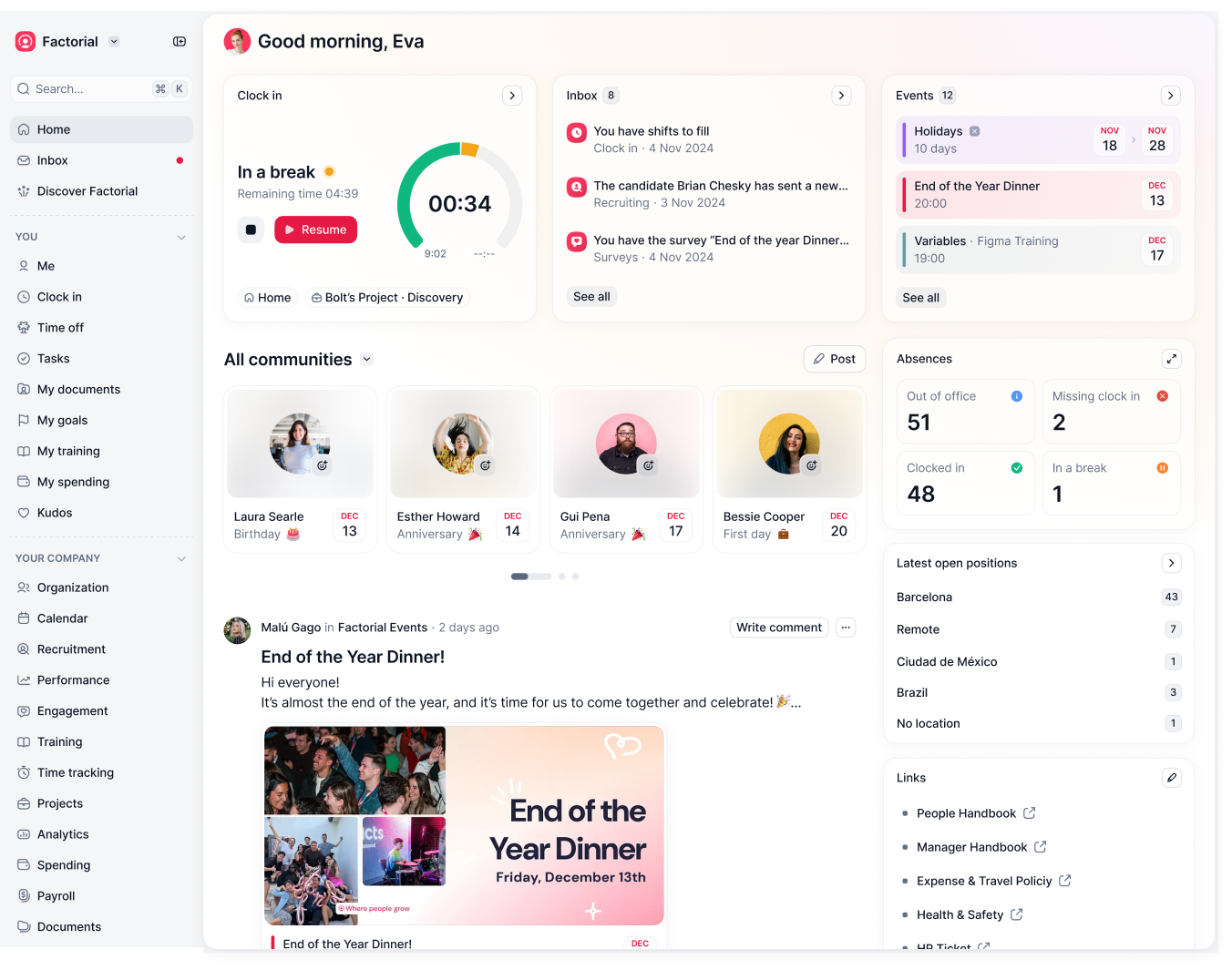
When it comes to selecting the ideal business management software for your construction company, Factorial’s emphasis on HR support makes it a compelling option. Construction companies require robust HR support to ensure they have a skilled, safe, compliant, and productive workforce. Factorial’s platform ensures HR teams can provide all these requirements.
Factorial facilitates the management of the entire workforce, from recruitment (including writing job descriptions, screening applicants, and scheduling interviews) and onboarding, to creating rosters, handling leave, and supporting the performance management process. The platform also provides reports and insights into the hours worked on specific projects, giving you confidence when tracking the financial side of each stream of work.
Key Features for construction companies:
- Clock-in/out with geofencing features: With Factorial’s mobile app, your team can clock-in/out from any job site with no issues. Additionally, with geofencing features, you’ll be able to ensure your employees are on-site which reduces time fraud and ensures accurate time-tracking.
- ROTA schedules: You can automate the creation of shift schedules based on availability, workload, and project needs which prevents any under- or over- staffing issues. This way, you’ll be prepared for peak seasons and complete deadlines on time.
- Stay compliant: Compliance is critical in the construction industry. Through Factorial’s platform, you can request e-signatures, store documents and certificates, and track employee hours for labor law compliance. This ensures you are fully prepared for any audits or inspections.
2. Monday.com
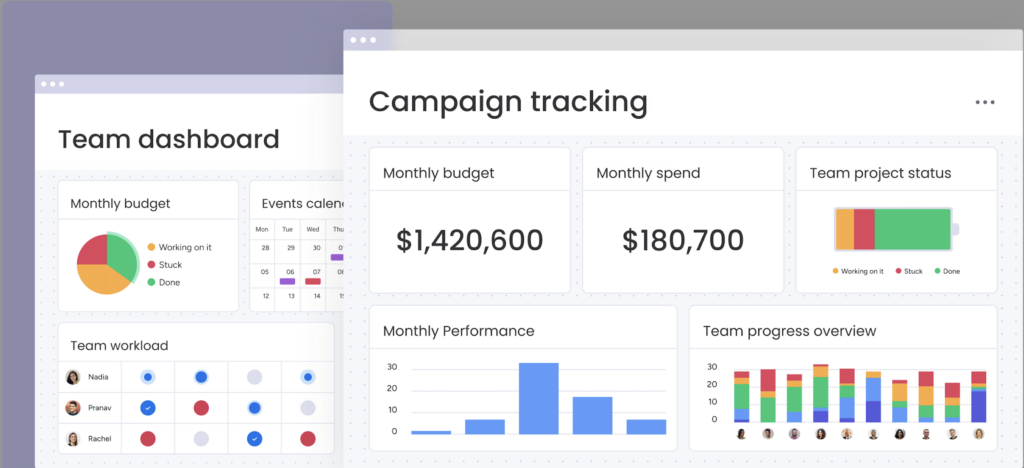
Monday.com can be a good choice for construction companies looking for a digital platform to support their workflow, as it offers visual tools and dashboards, centralised communication and workspaces, and comprehensive tracking tools to manage complex projects. As its focus is on project management, there may be less support for HR requirements, such as employee records and managing site workers’ contracts.
3. Jira
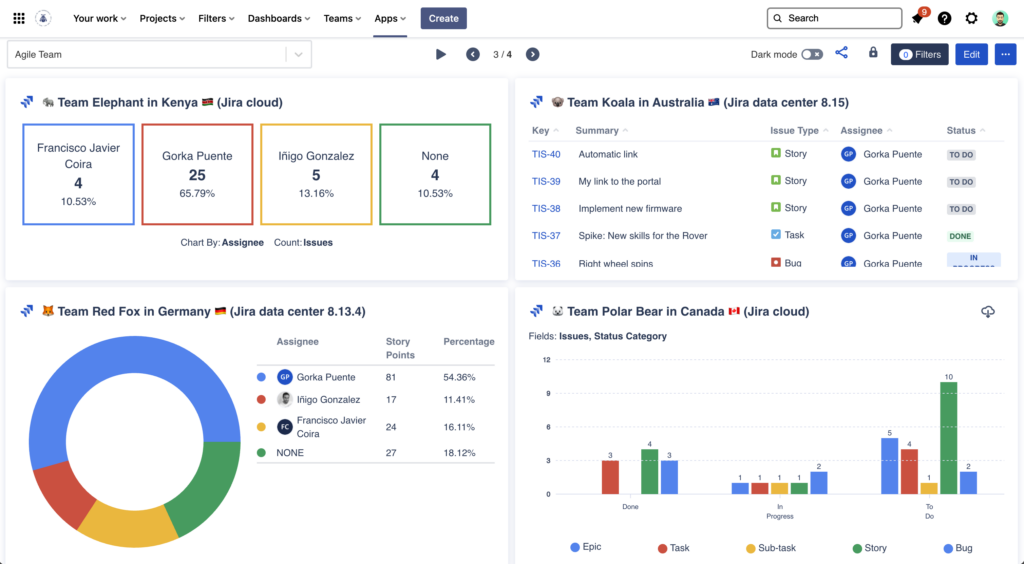
While construction companies may less commonly use Jira, it can be a good choice for small- or medium-sized companies that work with many other web-based applications. Jira is a suitable choice for any team that needs to plan and manage tasks, track progress, and facilitate collaboration among employees. However, some users find Jira less easy to use compared to other platforms, and it does not support employee management. It cannot handle leave requests, performance management, or HR record-keeping.
4. Asana
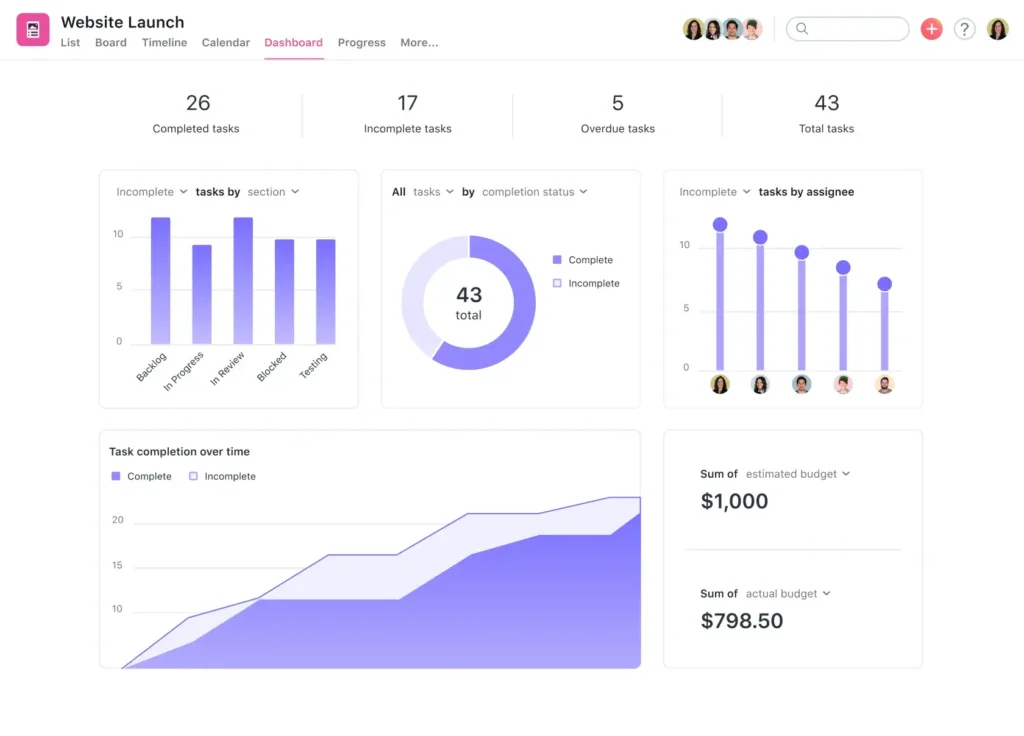
Another well-known project management tool, Asana has a strong proven track record of helping companies manage the administration and coordination required to keep multiple projects on track. It features a customisable ‘Board’ view to support complex deliverables and timelines for individual projects, and it can integrate with other tools, such as Google Drive and Slack. Like Jira, Asana cannot assist with workforce management, so it does not provide support for payroll, contracts, leave management, and document handling.
5. ClickUp
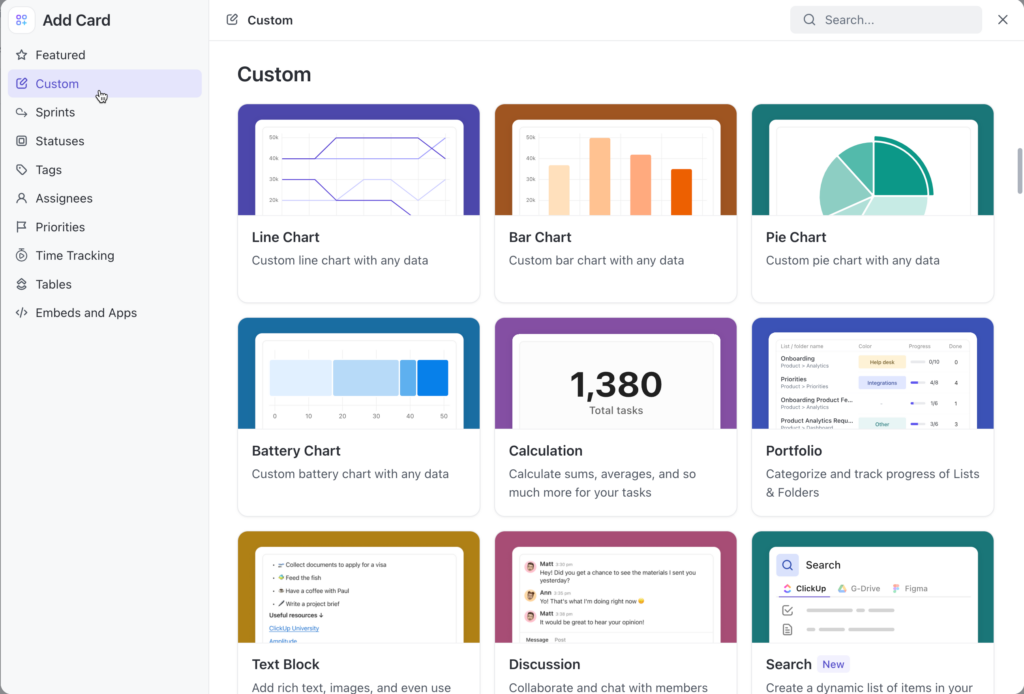
With its free plan supporting unlimited users, ClickUp is a popular choice for construction teams working with tight budgets who need help managing workloads. It utilises Gantt charts, timelines, and custom workflows to break down large projects into manageable sections. Like many software systems, it integrates with communication tools like Slack and can be used on a mobile to provide on-site updates. However, it does lack HR features and built-in analytics support for understanding workforce or finance trends.
6. SmartSheet
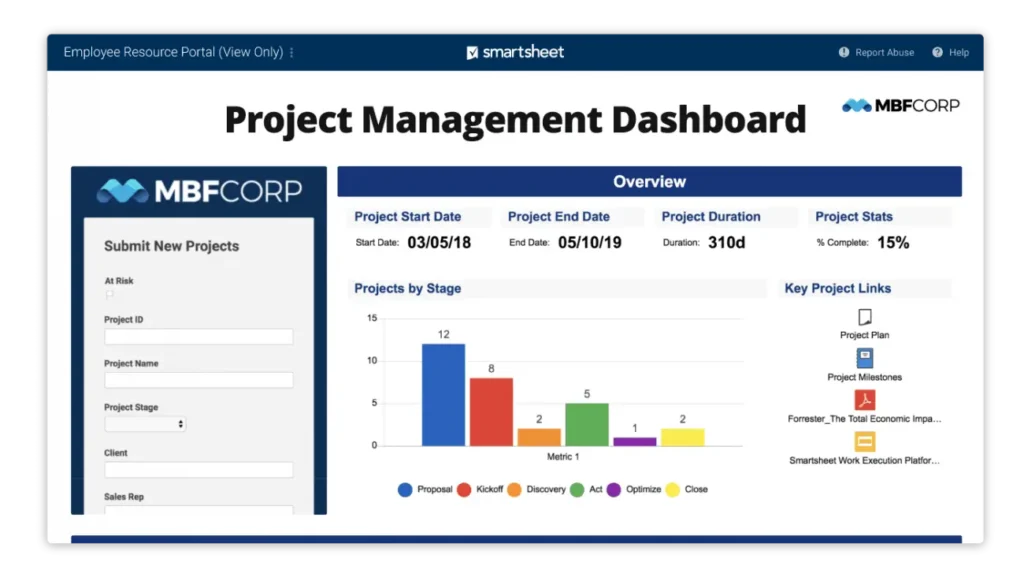
Another platform with a free plan, SmartSheet is a spreadsheet-style tool that supports planning, tracking progress, and meeting deadlines. It supports a personalised dashboard, which makes it user-friendly and allows for real-time monitoring of projects. The information contained in SmartSheet also feeds into reporting tools, providing valuable insights into the project’s progress. The capacity to store employee documentation, manage employees’ leave and performance, and support recruitment and onboarding is not a feature of SmartSheet.
FAQs about Construction Business Management Software
What is Construction Project Management Software?
Construction project management software is a digital platform that supports the construction industry in managing all the projects they are working on. Project management software focuses on resource management and allocation, budgets and forecasting, quality assurance and risk management. It aims to ensure that projects are completed on time, to budget, and meet all requirements.
How to Select Construction Project Management Software
When you are selecting project management software for construction, you and your team need to ask yourselves the following questions:
- What are the objectives for this software? What are construction specific challenges you are facing, and what support do you need from software that you are currently missing?
- Which key features are the most important for your construction business?
- Is the interface easy to use and accessible to all of the workforce?
- Does this software integrate with existing programmes you use?
- What is your budget?
- Can you scale the software if your business grows?
- Is the software secure?
- Can it support any compliance requirements you have?
- Does the software have a good brand reputation?
- How will they support onboarding and training?
Once you can answer these questions, it can be helpful to shortlist three different tools and compare them in terms of their features, pricing, ease of use, customer support and reviews from other users.
Always test the platform before you commit. Do a trial run on a small project, get feedback from users in your team, and don’t rush your decision-making.
What Software Works for Construction Management and Planning?
Many software options work for construction management and planning. Which one is right for your company depends on the size of the projects you work on, the type of projects you do, your location needs (for example, how essential mobile access is) and your budget.
The information presented on this page is based on publicly available sources and not limited to smartsheet.com, clickup.com, asana.com, jira.com, monday.com, Capterra public reviews, G2 public reviews, and trustpilot public reviews. The comparisons between Factorial and other providers, are intended solely for the illustration of the respective software features, pricing and functionalities. All information regarding features, prices, and integrations may be subject to change without prior notice. Factorial assumes no liability for the accuracy, completeness, or timeliness of the information presented. We recommend contacting the respective providers directly to obtain the most accurate and up-to-date information. All legal regulations regarding spanish fair advertising and competition law are fully observed by us; if you have any concerns, please reach out to us. The comparisons presented do not constitute a final evaluation or recommendation for any provider, but serve solely as an informational source.

